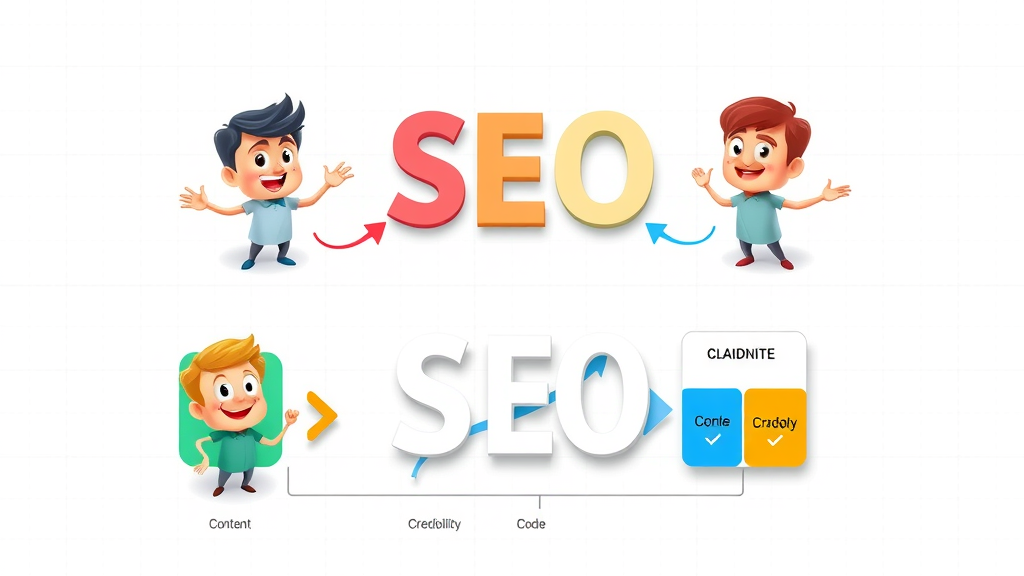Did you know that nearly 46% of all Google searches are people seeking local information, yet almost 60% of small businesses don’t have a solid SEO strategy? If you’re a business owner looking to outpace larger competitors and attract customers online, this guide gives you the step-by-step tactics needed to level the playing field — and even dominate it! Read on to see how even the smallest company can become a local leader through SEO for small businesses .
Why SEO for Small Businesses Matters: Surprising Truths and Growth Benefits
If you’re still on the fence about investing in SEO for small businesses , consider this: Google is the primary discovery tool for everything from nearby bakeries to consultancies, and it’s only gaining ground. Most business owners are surprised to learn that local SEO and business SEO services can deliver organic search visibility for even the smallest storefront, helping you reach potential customers right in your community and beyond. When you ignore search engine optimization , you hand the advantage straight to your competitors — many of whom are already reaping the search rewards.
Implementing a tailored seo strategy means your business stands out in search engine results, attracts more qualified leads , and builds trust with local customers. By optimizing your business profile , website, and online content, you establish credibility that appeals to both users and search engines. Plus, effective local SEO ensures you’re visible for high-intent queries, such as “best pizza shop near me” or “reliable accountant in [your city],” directly leading to more phone calls, visits, and ultimately, sales.

- Did you know that 46% of all Google searches are looking for local information, and yet nearly 60% of small businesses lack an SEO strategy? Discover how SEO for small businesses becomes the secret weapon for outpacing competitors and unlocking new streams of online traffic.
Achieving Success with SEO for Small Businesses: Top Outcomes You’ll Gain
Mastering SEO for small businesses is about more than just ranking higher — it’s about building long-term, sustainable growth. With the right seo services or approach, you’ll increase your business SEO footprint in search engines, positioning your company in front of ready-to-buy customers. Local SEO, in particular, has a fast ROI: customers searching for services in their area are typically further along the buying journey, and more likely to convert.
Proactive small businesses who focus on search engine optimization gain a serious edge. They obtain increased organic visibility for both branded and non-branded searches, attract higher quality leads, and experience measurable growth through local SEO tactics. By taking intentional, actionable steps—from building your Google Business Profile to publishing high-quality content—your company can compete head-to-head with bigger brands, often outmaneuvering them in your local market.
- Increased organic visibility in Google and other search engines
- More qualified leads for your small business
- Competitive advantage with strategic SEO services
- Lasting business growth through efficient local SEO
- Actionable steps for building a winning business SEO strategy

Understanding SEO for Small Businesses: Core Principles and Key Definitions
SEO for small businesses isn’t just about stuffing keywords into your homepage — it’s a holistic process that involves site structure , technical optimization, and smart content creation. At its core, search engine optimization for a business owner means making your website and business profile easier for search engines like Google to find, read, and trust. For small businesses, local SEO service bridges the connection between your business profile and local search intent — ensuring you’re seen by those most likely to become paying customers.
You’ll need to understand the difference between local SEO and traditional business SEO . While both aim to boost your online presence, local search focuses on showing up for location-based queries (“pizza shop near me”), while classic SEO services cast a wider net. Tools such as Google Business Profile and Google Search Console are critical — they give you control over how your business appears in search results and provide vital performance insights that guide your SEO strategy .
SEO for Small Businesses Explained: From Search Engine Optimization to Local Search
What is small business SEO? In short, it’s the tailored practice of using search engine optimization techniques to help your small business appear in relevant online searches—whether local or national. Business SEO , when paired with a robust business profile and consolidated through local SEO services, lets search engines understand your offerings so you show up for the right customers.
How do business SEO and local SEO services differ? Business SEO enhances your website’s global or regional reach, while local SEO zeroes in on geo-targeted queries and citations. If you own a brick-and-mortar store, optimizing your Google Business Profile and managing Google Search Console performance are non-negotiable essentials to stay ahead in search engine results .
- What is small business SEO?
- How business SEO and local SEO services differ
- Why search engines prioritize relevant, quality content
- The role of Google Business Profile and Google Search Console

“SEO for small businesses isn’t just a marketing tactic – it’s the backbone of sustainable, long-term online growth.”
Developing the Perfect SEO Strategy for Small Businesses
Creating a winning SEO strategy for your small business begins with understanding your goals and mapping out the steps necessary to achieve them. It’s not just about choosing the right words or chasing after every new SEO service trend. Instead, effective business SEO strategies focus on careful keyword research , seamless site structure, and leveraging powerful tools like Google Search Console and Google Business Profile .
For a business owner serious about growth, the first step is an honest evaluation: what keywords matter to your business, who is your audience, and how can your website answer their needs? Next comes organizing your site structure to ensure both search engines and users can navigate easily, and making data-driven improvements based on analytics.
Conducting Smart Keyword Research for SEO for Small Businesses
Keyword research is the foundation of successful SEO for small businesses . Start by identifying relevant search terms that your potential customers might use when looking for your services. Don’t just focus on high-volume words; target local search phrases (“best bakery in Brooklyn”) and niche terms. Utilizing both free and premium tools—such as Google Keyword Planner, Moz, or Ahrefs—lets you uncover valuable keyword opportunities for your business profile .
When conducting keyword research , check your competitors by searching the keywords you want to rank for. Analyze the top-ranking search engine results and note their title tag , meta description , and how they structure their content. This will help you determine gaps and avenues to outperform them with your own local SEO and business SEO strategy.
- Discovering the best keywords for your business profile
- Focusing on local search and niche terms for local SEO
- Using free and paid keyword research tools effectively
Building a Robust Site Structure for Business SEO Performance
A user-friendly, well-organized site structure is critical for both search engines and visitors. Think of your site as a physical store: if customers can’t find what they need quickly, they’ll leave. Search engines also crawl your site structure, evaluating how pages connect, what URLs exist, and how easy it is for users to access important content.
Proper use of on-page SEO—including title tags, meta descriptions, header tags, and internal links—signals to search engines what each page is about. For best results, each page should target a unique keyword, include descriptive headings (H1, H2), and feature multimedia (images, video) that enhance user experience. Business owners should periodically audit their websites for broken links and outdated pages that can hurt both user experience and SEO performance.
- The importance of a user-friendly site structure
- How search engines crawl and assess small business SEO
- On-page SEO fundamentals for small businesses

Optimizing Google Business Profile and Google Search Console for Local SEO
No local SEO strategy is complete without a fully optimized Google Business Profile . Be sure to claim and verify your business, add accurate contact info, upload quality photos, and update your profile regularly with promotions, posts, and responses to reviews. Search engines use your business profile as a trust signal and display it prominently in local search results.
Leverage Google Search Console to monitor keyword rankings, identify technical problems, and fix errors that could be limiting your visibility in engine results . Regular updates and frequent review management can set your business apart and drive more local traffic to your website—and through your front door.
- Completing and managing your Google Business Profile
- Tracking performance and fixing issues with Search Console
- Leveraging business profile reviews and updates
Local SEO for Small Businesses: Winning Customers Near You
Local SEO puts your business on the map—literally. For small businesses, standing out in local search often means the difference between thriving and merely surviving. Local SEO services maximize your exposure in Google Search and Maps, making your business profile easy for nearby customers to discover and contact.
Optimizing for location-based searches and citations, building a solid backlink profile, and focusing on review generation will boost your search engine visibility. “Near me” and geo-specific searches (“best plumber in Denver”) increase every year, and small businesses with optimized local SEO get a competitive edge in both digital and walk-in customer acquisition.
How Local SEO Services Utilize Google Search and Maps for Business Growth
Local SEO is distinct from broader SEO services because it’s laser-targeted for searches made by people in your area. By enhancing your Google Business Profile, encouraging local reviews, and building citations on reputable directories, you dramatically raise your chances of showing up in local “map pack” results—the three highlighted businesses shown at the top of Google Search for location queries.
Focused local SEO means optimizing your website and online listings for queries containing terms like “near me” or your city’s name. Building strategic local backlinks from community organizations and maintaining accurate citations further signals relevance to search engines , rounding out a powerful local business SEO strategy.
- What local SEO achieves compared to standard SEO for small businesses
- Optimizing for ‘near me’ and location-specific searches
- Local link building and citations

Case Study: Small Business Ranking Success with Local SEO
One local bakery faced intense competition from both chain stores and established independent shops. By focusing their SEO strategy on local search —optimizing their Google Business Profile, asking happy customers for reviews, and creating location-specific blog posts—they quickly rose to the top of local search engine results. The outcome? A 50% increase in phone calls , a surge in in-store visits, and online booking requests that surpassed even their busiest seasons.
Their efforts highlight how targeted local SEO services can close the gap with bigger competitors. Being strategic, leveraging Google Search Console , and showcasing quality content built reputation and trust—translating directly to business growth.
- How one business used local SEO tactics to outrank bigger competitors
- Results: increased phone calls, visits, and online bookings
| Strategy | Cost | Ease of Implementation | Typical ROI |
|---|---|---|---|
| Google Business Profile Optimization | Free | Easy | High |
| Local Link Building | Low to Moderate | Moderate | Medium to High |
| Directory/Citation Listings | Usually Free | Easy to Moderate | Medium |
| Content Creation (Local Blogs/Guides) | Low to Moderate | Moderate | High |
Producing Quality Content for SEO for Small Businesses
High-performing SEO for small businesses starts with quality content . Well-crafted blog posts, guides, and videos are critical drivers of organic traffic . Search engines reward pages that thoroughly answer searchers’ questions with substance, clarity, and fresh information. For small businesses, content that highlights expertise and ties into local events, products, or news establishes both authority and relevance.
Explore varied content types—think detailed blog posts, product/service pages with robust FAQs, customer testimonials, and multimedia like photos or explainer videos. These assets support business SEO and provide more opportunities for keywords, engagement, and backlinks. Prioritizing quality content builds trust, keeps visitors returning, and signals to Google that your site deserves top placement.
The Role of Quality Content in Small Business SEO
Not all content is created equal. To help your small business SEO efforts, focus on posts that answer real questions, match user intent, and showcase your expertise. Blog topics, how-to guides, video explainers, and customer success stories are some of the best performers for driving both organic search traffic and repeat engagement.
Go beyond the basics: use eye-catching headlines and relevant images for each post. Embedding video tutorials or before/after photos of your projects encourages clicks, increases session time, and diversifies the content types search engines evaluate—all vital for robust SEO services .
- Types of content that drive traffic: blogs, guides, videos
- Why quality content helps with search engine optimization
- Using multimedia (images, video) to support SEO strategy

Tips for Creating Search Engine-Friendly Content
Effective SEO for small businesses demands attention to keyword placement and content structure. Use keywords naturally in your title tag , main headings, and throughout the copy, but always prioritize readability and user intent. Avoid keyword stuffing—search engines are sophisticated and value meaningful, helpful information above all.
Break up your posts using header tags (H2s and H3s), bullet points, and images so readers can scan easily. Incorporate succinct meta descriptions that summarize your content’s value and entice clicks from search results. Whenever possible, add internal links to related pages—this strengthens your site structure and helps both users and search engines navigate your site.
- Keyword placement and density
- Prioritizing user intent and helpfulness
- Structuring posts for easy scanning; using header tags, bullet points, and images

Choosing the Right SEO Service or DIY Approach for Small Businesses
Should you hire a professional SEO service or handle your site’s optimization in-house? The answer depends on your time, skills, budget, and how quickly you hope to see results. Outsourcing to experienced SEO services saves time and brings specialized knowledge, but requires a larger investment. DIY can be more budget-friendly; however, it demands ongoing learning and regular effort from the business owner or team.
Analyze your goals and resources before choosing. For many small businesses , a balanced approach—starting with DIY basics and augmenting with focused SEO services as you scale—offers flexibility and manageable costs.
Pros and Cons: Hiring SEO Services Versus Doing SEO Yourself
| Option | Cost | Required Skills | Typical Results | Best For |
|---|---|---|---|---|
| Professional SEO Service | Medium to High | Minimal on client side | Faster, expert-level, scalable | Busy owners, fast growth goals |
| DIY SEO | Low | Technical, copywriting, analytics skills needed | Gradual, learn-as-you-go, customizable | Startups, very small teams |
Questions to Ask Before Hiring an SEO Service
Before signing a contract with any seo service , make sure you ask the right questions. Does the provider specialize in small business SEO or local SEO services? What reporting and analytics are included? How often will they update you on progress, and do they handle Google Business Profile management? Clarifying these points ensures you’re investing in the right partner for your growth journey.
- Do they specialize in small business SEO?
- What tools and reporting do they provide?
- Are local SEO services included?

“The right SEO service will act as a true partner in your business growth — not just a vendor.”
Monitoring Success: Using Search Console and Analytics for Business SEO
Once your SEO strategy is live, regular monitoring ensures your efforts produce measurable results. Setting up Google Search Console allows you to verify your site, monitor important metrics like search traffic and keyword rankings, and quickly identify technical issues. Analytics provides deep insights into which pages drive traffic and what changes result in improvements.
With these tools, business owners can pinpoint which SEO services are delivering results and which content resonates most with users. Adjust your business SEO plans using real data — not guesswork — to boost ROI and ensure continued progress.
Setting Up Google Search Console for Maximum Effect
First, register your site in Google Search Console and verify ownership. This allows you to track search engine queries, clicks, impressions, and other key data. You’ll also receive alerts if Google identifies crawling errors or security issues that could affect your small business SEO efforts.
- Verifying your site in Search Console
- Tracking search engine keywords, clicks, impressions
- Addressing technical errors affecting small business SEO
Interpreting Data to Guide Your SEO Strategy
Every business owner should become familiar with the main reports in Google Search Console . Knowing which keywords bring the most organic traffic , which pages have the highest engagement, and how technical issues are resolved informs smarter, more adaptive strategy development.
- Assessing which SEO services deliver the best ROI
- Adjusting content based on traffic and rankings
- Examples of Google Search Console reports

People Also Ask: SEO for Small Businesses Insights
Does SEO really work for small businesses?
Absolutely — when tailored for small businesses, SEO can dramatically increase visibility, attract targeted customers, and generate more conversions. The impact is often seen within a few months, with compounding benefits over time.
How much should SEO cost for a small business?
Typical costs range from $500–$2000/month for reputable SEO services , though DIY and local SEO campaigns can be done for less. The investment should reflect your business goals and desired speed of results.
What are the 3 C’s of SEO?
The three pillars are Content (quality, relevance), Code (technical optimization), and Credibility (authority, backlinks). Small business SEO must address each area for best results.
What are the 4 types of SEO?
- On-Page SEO: optimizing content and site structure.
- Off-Page SEO: building authority with backlinks.
- Technical SEO: improving crawling, speed, and usability.
- Local SEO: focusing on geo-targeted search engine results.

Expert Tips and Tools: Accelerating Success with SEO for Small Businesses
- Actionable SEO tips for small businesses:
- Claim and update your Google Business Profile
- Focus on long-tail keywords
- Ensure fast, mobile-friendly website design
- Collect and respond to customer reviews
- Consistently publish local and niche content
- Top tools: Google Search Console, Moz, Ahrefs, SEMrush, Surfer SEO

Checklist: Building and Maintaining an Effective SEO Strategy for Small Businesses
- Define SEO goals for your small business
- Identify target and local SEO keywords
- Optimize your site structure, pages, and metadata
- Publish high-quality, search-optimized content
- Set up and monitor Google Business Profile and Search Console
- Build reputable backlinks and listings
- Track and adjust your SEO strategy regularly
Quick Reference: SEO for Small Businesses FAQ
- How long does it take for SEO for small businesses to show results?
- Can SEO outperform paid ads for small businesses?
- What’s the first thing every small business owner should do for SEO?
- Is local SEO necessary for all small businesses?
- Which SEO services are worth outsourcing?
Most small businesses will notice meaningful improvements in search rankings and organic traffic within 3–6 months of continuous SEO efforts.
Yes! For many, SEO delivers a higher return on investment over time compared to ongoing expenses for paid ads.
Claim and optimize your Google Business Profile to gain immediate local visibility and control how your business appears in search results.
If you have a physical location or serve a geographic area, local SEO is essential to reaching new customers and outperforming local competitors.
Technical audits, ongoing keyword research, and high-quality content creation are the top areas where professional SEO services can fast-track your success.
Key Takeaways for Small Businesses Crafting a Winning SEO Strategy
- Consistent, high-quality SEO efforts deliver substantial long-term results
- SEO for small businesses is accessible and affordable
- Combine local SEO strategies, content, and technical best practices
- Regularly measure and adapt for continued growth
“With a focused SEO strategy, even a small business can dominate its local search market and compete with major brands.”
Ready to Grow? Affordable SEO for Small Businesses Starts Here
- Ready to grow your business without the full-time CMO price tag? Let’s talk about how our affordable, on-demand marketing leadership can work for you. 👉 Call, text, or schedule your FREE consultation today at https://aiwebforce.com/contact-us/
Watch: How SEO for Small Businesses Drives Results (Video)
Video Guide: Step-by-Step Local SEO Setup for Small Businesses
Conclusion: Start implementing these proven SEO strategies today—define your goals, optimize your profiles and structure, publish relevant content, and monitor your results for ongoing local business growth.
To further enhance your understanding of SEO for small businesses, consider exploring the following resources:
- “Top SEO Tips for Small Businesses to Grow Your Website” ( web.com )
This guide offers nine actionable SEO best practices tailored for small businesses, including setting up Google Analytics and Google Search Console, optimizing your Google Business Profile, and conducting thorough keyword research.
- “8 SEO Tips for Small Businesses” ( builtin.com )
This article provides insights into focusing on quality content, optimizing site architecture, claiming business listings, and generating backlinks to enhance your website’s visibility and attract more traffic.
By delving into these resources, you’ll gain practical strategies to implement effective SEO tactics and drive sustainable growth for your small business.

